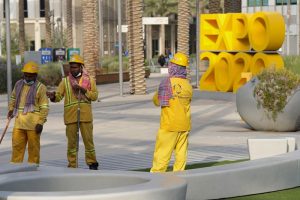DUBAI : Intent on making a flawless impression as the first host of the world’s fair in the Middle East, Dubai sought to leave nothing to chance.
It poured billions of dollars into its pristine fairgrounds and jubilant festivities that opened last month, aiming for 25 million visits to the pandemic-delayed Expo 2020.
Propping up the world’s fair is the United Arab Emirates’ contentious labor system that long has drawn accusations of mistreating workers. Highly sensitive to its image and aware that Expo attracts more attention to its labor practices, Dubai has held companies on the project to higher-than-normal standards of worker treatment. Contractors offer benefits and better wages to Expo workers, compared with elsewhere in the country, and many are grateful for the jobs.
Yet according to human rights groups and interviews with over two dozen workers, violations have persisted, underpinned by the UAE’s labor sponsorship system. It relies on complicated chains of foreign subcontracts, ties workers’ residency to their jobs and gives outsized power to employers.
Expo’s statement acknowledged the workers’ “most regularly raised topics of concern” involved “wage payments and food,” without elaborating. It said authorities have “worked directly with contractors to remedy both immediately.”
“Some cases have been identified where accommodation facilities have been found to not be in line with UAE legal requirements,” it added. “In such cases we work with a contractor to move workers to adequate accommodation facilities.”
Citing labor abuses at Expo and other human rights concerns, the European Parliament has urged a boycott of the event. The UAE called the resolution “factually incorrect,” without elaborating.



